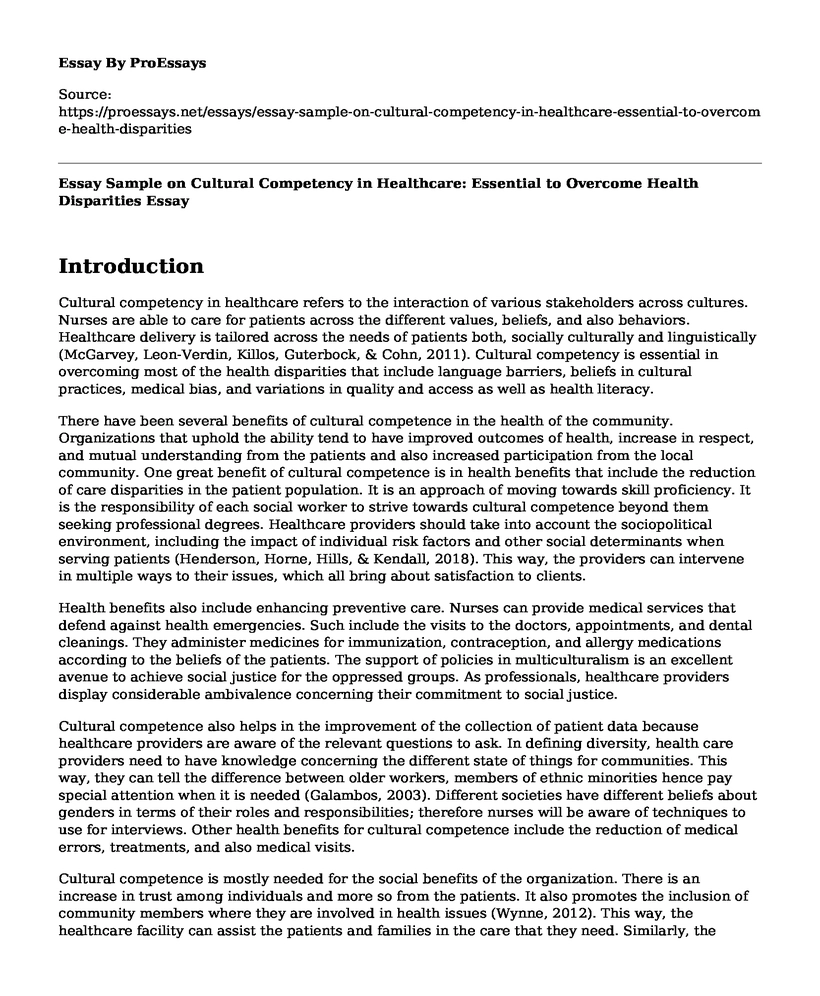Introduction
Cultural competency in healthcare refers to the interaction of various stakeholders across cultures. Nurses are able to care for patients across the different values, beliefs, and also behaviors. Healthcare delivery is tailored across the needs of patients both, socially culturally and linguistically (McGarvey, Leon-Verdin, Killos, Guterbock, & Cohn, 2011). Cultural competency is essential in overcoming most of the health disparities that include language barriers, beliefs in cultural practices, medical bias, and variations in quality and access as well as health literacy.
There have been several benefits of cultural competence in the health of the community. Organizations that uphold the ability tend to have improved outcomes of health, increase in respect, and mutual understanding from the patients and also increased participation from the local community. One great benefit of cultural competence is in health benefits that include the reduction of care disparities in the patient population. It is an approach of moving towards skill proficiency. It is the responsibility of each social worker to strive towards cultural competence beyond them seeking professional degrees. Healthcare providers should take into account the sociopolitical environment, including the impact of individual risk factors and other social determinants when serving patients (Henderson, Horne, Hills, & Kendall, 2018). This way, the providers can intervene in multiple ways to their issues, which all bring about satisfaction to clients.
Health benefits also include enhancing preventive care. Nurses can provide medical services that defend against health emergencies. Such include the visits to the doctors, appointments, and dental cleanings. They administer medicines for immunization, contraception, and allergy medications according to the beliefs of the patients. The support of policies in multiculturalism is an excellent avenue to achieve social justice for the oppressed groups. As professionals, healthcare providers display considerable ambivalence concerning their commitment to social justice.
Cultural competence also helps in the improvement of the collection of patient data because healthcare providers are aware of the relevant questions to ask. In defining diversity, health care providers need to have knowledge concerning the different state of things for communities. This way, they can tell the difference between older workers, members of ethnic minorities hence pay special attention when it is needed (Galambos, 2003). Different societies have different beliefs about genders in terms of their roles and responsibilities; therefore nurses will be aware of techniques to use for interviews. Other health benefits for cultural competence include the reduction of medical errors, treatments, and also medical visits.
Cultural competence is mostly needed for the social benefits of the organization. There is an increase in trust among individuals and more so from the patients. It also promotes the inclusion of community members where they are involved in health issues (Wynne, 2012). This way, the healthcare facility can assist the patients and families in the care that they need. Similarly, the competence helps in promoting patient and responsibility of family health as well as increasing the mutual respect while understanding patients accurately. The perceptions of heath across areas are different; hence people believe in the various status of health and its utilization.
Conclusion
Healthcare providers need to develop their culture competent skills by ensuring that they have the knowledge to identify and report any disparities. They should involve the community and make the competency a priority for the institution. Achieving cultural competence in a facility begins at a system level.
References
Galambos, M., C. (2003). Moving cultural diversity toward cultural competence in health care. Health and social work, ProQuest
Henderson, S., Horne, M., Hills, R., & Kendall, E. (2018). Cultural competence in healthcare in the community: a concept analysis. Health & social care in the community, 26(4), 590-603.
McGarvey, E. L., Leon-Verdin, M., Killos, L. F., Guterbock, T., & Cohn, W. F. (2011). Health disparities between Appalachian and non-Appalachian counties in Virginia, USA. Journal of community health, 36(3), 348-356.
Wynne, R. (2012). Defining diversity- five different forms of diversity mark the EU workplace- and businesses must be prepared to address them all. BizEd
Cite this page
Essay Sample on Cultural Competency in Healthcare: Essential to Overcome Health Disparities. (2023, Mar 27). Retrieved from https://proessays.net/essays/essay-sample-on-cultural-competency-in-healthcare-essential-to-overcome-health-disparities
If you are the original author of this essay and no longer wish to have it published on the ProEssays website, please click below to request its removal:
- Regulation of Professional Practice in Nursing Essay
- Pressure Ulcer Management Among ICU Nurses in Saint Elizabeth Facility
- Essay Example on Protecting the US Homeland: The 2002 Emergency Preparedness Act
- Research Paper on US HIV/AIDS Crisis: Youth, African Americans Severely Affected
- Essay Example on Non-Western Healing Systems: A Comprehensive Overview
- Nursing School: Challenges & Rewards of an Educationally Arduous Experience - Essay Sample
- Paper on The Notebook: A Romantic Movie's Treatment of Dementia







